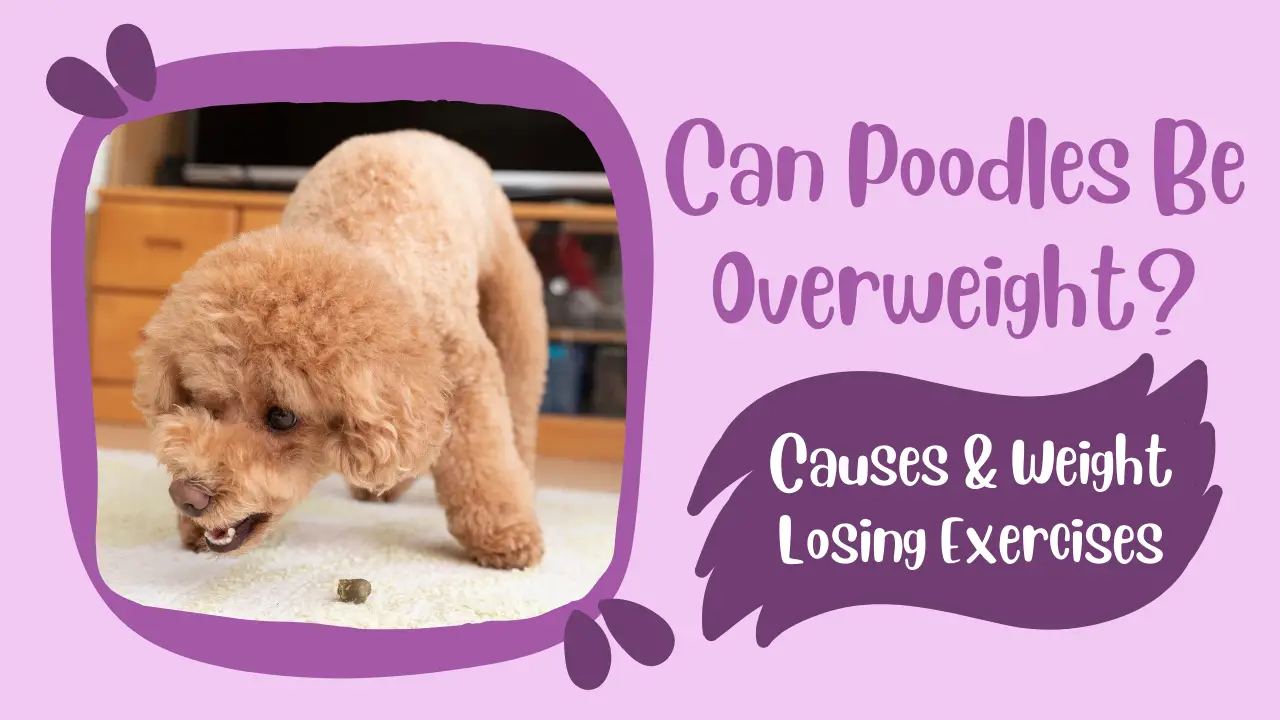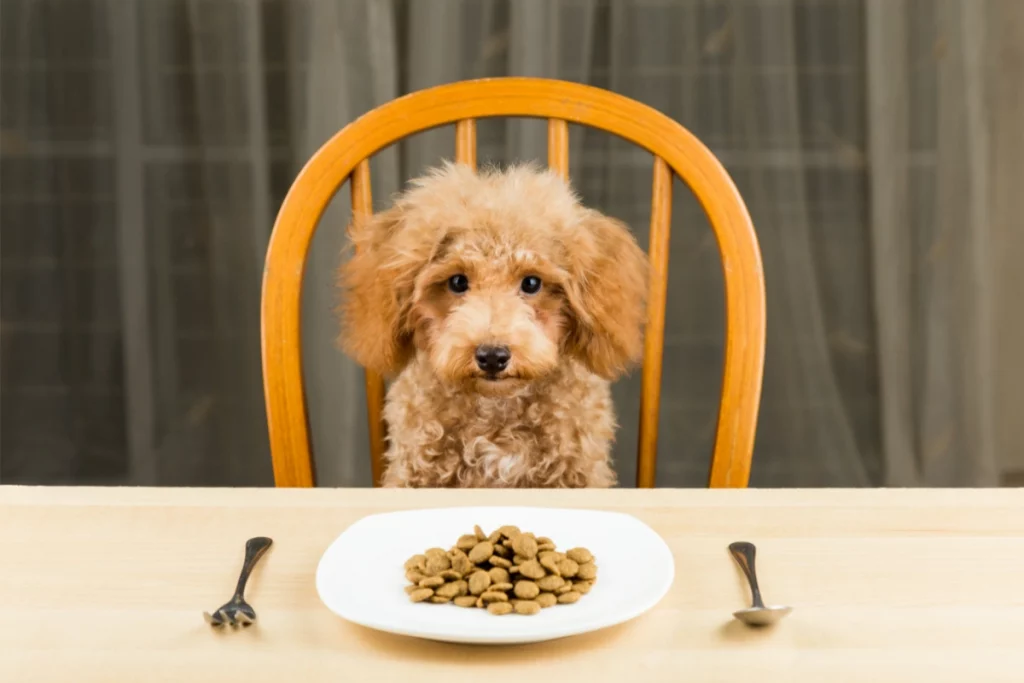Are you conscious about your weight, diet, or lifestyle habits?

If that’s a yes, you should devote the same concerns you have to your dog, especially if you have a Poodle.
Obesity is so common in dogs, and in North America, it affects around 25-30% of the general population.

Read our Smart Poodles - Smart Tricks eBook for only $2.99
Dive into a treasure trove of engaging tricks and tips designed specifically for your poodle!
Being overweight can be highly dangerous in breeds like the Poodle, triggering cancer, diabetes, hypertension, heart disease, osteoarthritis, and more.
So as a dog owner, it would be best if you did everything in your power to stop this and extend their lifespan as long as possible. To do this, you must detect the signs of obesity and know how to take action when it does occur.
What Will You Learn? 👇
How to tell if your Poodle is overweight?
Before I explore the typical signs of an unhealthy weight for a Poodle, let’s redefine exactly what being overweight is. For a Poodle to be overweight, they will have excess body fat, a lot more than average.
Usually, their high amounts of fat will have a direct correlation to an increased weight gain. On average, they will be around 10-20% higher than their standard weight and will be placed into the obese category of 20% when they’re more than their typical body weight. We’ve covered a more in-depth topic of the weight and size of the standard poodle as well as the weight and size of the miniature poodle.
Now you have a basic idea, let’s look at the key indicators to look for on an overweight Poodle.
Weighting your poodle
How often do you weigh your canine? Ideally, you should be weighing your Poodle every six months to make sure they’re in check. But you can weigh them more if you suspect your Poodle is overweight. It’s also important to know that when weighing a Poodle, the number on the scale might trick you into thinking they’re overweight when they’re not.

When weighing them, it’s always good to have a Poodle breed comparison chart to compare their weight according to it. You can easily get these charts online or from your vet. Make sure the chart includes a Poodles ideal height and weight according to its gender and age. Plus, if you find your dog 20% heavier than the average recommendation, you should take them to a vet for further consultation.
Conduct a rib test
A Poodle’s ribs can easily indicate whether they’re overweight or not. You can conduct a rib test at home by placing your hand around their abdomen and flanks. If a Poodle is at a healthy weight, you will feel their ribs but won’t notice them visibly. However, if you do see them, it can be a sign your dog is underweight.
On the contrary, though, if you cannot feel a Poodles ribs, it means they’ve probably accumulated enough fat that needs to be cut down. This is a big sign that a Poodle needs a change of diet and exercise.
Protruding abdomen
Ok, so a dog wouldn’t be a dog without a prominent abdomen. After all, it’s not like they’re going to get six-packs and flat stomachs like us. But, what I mean by this is you view a Poodle from the side; they should have a wide chest and a thinner abdomen, like a tuck at their stomach. However, if a Poodle is overweight, their stomach might look like a tube or have a more protruding abdomen than normal.
Waist shape
Another simple way to detect if your Poodle has gained weight is by looking at them from above. If their waist is thicker or straight, this is definitely a sign they’re unhealthy. The ideal waist for a Poodle should be an hourglass shape.
Tail base
You should also feel their tail and see if you can feel the bone. If you cannot feel their tail bone, then it’s most likely your Poodle is overweight.
Lack of interest in physical activities
Poodles are a highly energetic and alert breed. If your Poodle is showing a sudden change in behavior towards physical exercise, this can cause concern.
Especially if they choose to spend more time on the couch, sleep more, and opt for the indoors more than the outdoors. If you’re familiar with this behavior, it’s most likely a Poodle has become like this as their weight has gotten in their way. They may choose to be lazy as they’re exhausted easily!
Reduced stamina
If you notice your Poodle not being able to partake in their regular activities and playtime like before, this can be a sign of obesity. Try to look out for signs of a smaller duration of exercise, their running speed, and signs of tiredness.
Stair climbing
Do you live in a multi-story house? If so, you should look if your Poodle is actively trying to avoid climbing the stairs. Similarly, they may take more attempts to climb the stairs if they fail the first time, as their weight can stop them from jumping or ascending.
Monitor their breathing
When performing any basic movements like walking or running, check how easily your Poodle gets out of breath. If you notice them wheezing when making basic movements, it could be a cause for concern. The same applies to them if they’re getting out of breath climbing stairs or jumping onto the couch.
Are poodles prone to weight gain?
When you think of weight gain in a dog, most likely, overfeeding comes to your mind. While that’s one of the most popular ways a Poodle can gain weight, other ways should not be ignored, which are:
Age
As Poodles get older, they become subject to a condition known as sarcopenia, which involves them losing muscle mass. Once they start to lose more muscle mass, their metabolism slows down, causing more fat to develop in their body. This is why it’s essential to make sure your Poodle stays active even when they get older, so this does not happen too quickly.
Hormones
If your Poodle has a thyroid disorder like hypothyroidism, it could be a big indicator of weight gain and sluggishness. Part of the reason is that these diseases produce excess cortisol, making them more sluggish and prone to weight gain.
Hip dysplasia
All three types of Poodle can be prone to a lot of diseases and conditions, especially Doodles. One common condition that can occur in them all is hip dysplasia.
If you’re not familiar with this, it’s when a Poodles ball and socket joint does not align properly, causing decreased activity and a reduced range of motion. A major downside of hip dysplasia is that it can cause weight gain as the pain from the misalignment can make a Poodle less active.
Osteoarthritis
Like humans, Poodles, when they get older, can become at risk of arthritis and osteoarthritis. This is caused when their joint cartridges start to wear out, and it triggers arthritis. Again, the pain from this condition can cause a Poodle to become lazier and less active, making it difficult to exercise.
Lack of exercise
How often do you exercise your Poodle? According to the Kennel Club, you should be exercising them up to 1 hour every day. If your Poodle is not meeting these requirements, they could be gaining weight easily. However, as a dog owner, you don’t always need to stick to the one hour a day method if you take them on a high-intensity play session or run; this can also add up to one hour.
If your Poodle has been recently spayed or neutered
Sometimes, when a Poodle has undergone a significant operation such as being spayed or neutered, we see weight gain. Neutering affects hormone levels in both sexes and slows metabolism. Also, castration can initially easily decrease the appetite in male dogs and make them more lethargic. Similarly, it can affect other hormone levels in a female Poodle.
Too many carbohydrates
When feeding your Poodle, you shouldn’t just focus on the calories! It also depends on the type of food you’re feeding them and the number of carbs you’re giving them. If their diet consists of too many carbohydrates, this can trigger insulin production, which can then cause more body fat and a larger appetite.

Food intake
Just like I mentioned earlier, too much food can easily make a Poodle obese. Ideally, if you’re feeding your Poodle too big portion sizes or handing them many treats each day, this is a significant contributor to their weight gain.
How can I get my Poodle to lose weight?
If you feel your Poodle is overweight or the vet has indicated they need a lifestyle change, then doing it is really easy to implement. But, for it to be effective, you must be consistent and have a proactive attitude to doing so. Here are some easy solutions to adopt to help your Poodle lose weight:
Exercise
One of the best things to do is take them for rigorous exercise frequently to help increase their heart rate and shift that extra weight. It’s important, though; you don’t just make them go right into rigorous exercise; gradually introduce it into their routine.
If you don’t do this, you could put your Poodle at risk of joint problems and injury. Plus, consider the environment you do the rigorous exercise in, i.e., you might want to avoid doing it in the sun to stop them from overheating.
Portion control
It’s important to be specific with exactly how much food you’re feeding your Poodle. You don’t want to always depend on the feeding guidelines you discover online or on the back of dog food packaging.
Any treats, chews or dental sticks given should be subtracted from the daily food allowance
It would help if you took in a range of factors and then consulted with a vet to get the portion sizes right. To help you with this, you might also want to use a specialized feeder and timed portion feeder to stop your dog from overeating.
Specialized food

It would be best if you spoke to your vet to know which brands are best in this matter for a Poodle. Also, opt to give them more protein and less carb-based meals to help them lose or maintain weight.
Conclusion
Overall, a Poodle can become overweight for various reasons; it’s not all just about overeating. As a dog owner, you must check their weight at least every six months to make sure they’re in shape. You can check for obesity by feeling for their ribs, tailbone, abdomen, observing their interest in physical activities and stamina.
If you suspect your Poodle is overweight, you should take them to a vet for a further review. Potentially, a vet might rule out any underlying conditions or operations that are triggering their weight gain. Once you’ve identified their weight gain, you can help lower it by taking them for rigorous exercise, portion control, and providing them with specialized food.
But, you must stay consistent and patient to achieve their weight loss goal.
Do you have an overweight dog? Please share your experience with us.
Marko is the founder and author at PoodleHQ, where he blends profound expertise with formal training in Animal Behavior and Canine Genetics. With multiple generations of poodles under his care, he’s a breed connoisseur, honored with the Canine Care Excellence Award and lauded by the International Pet Enthusiasts Association.

